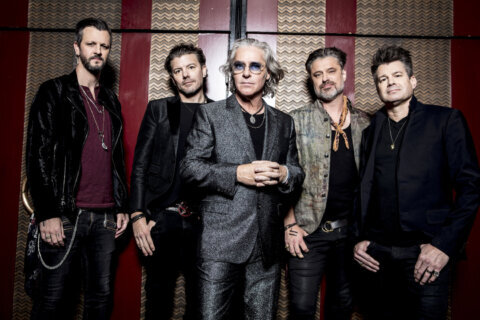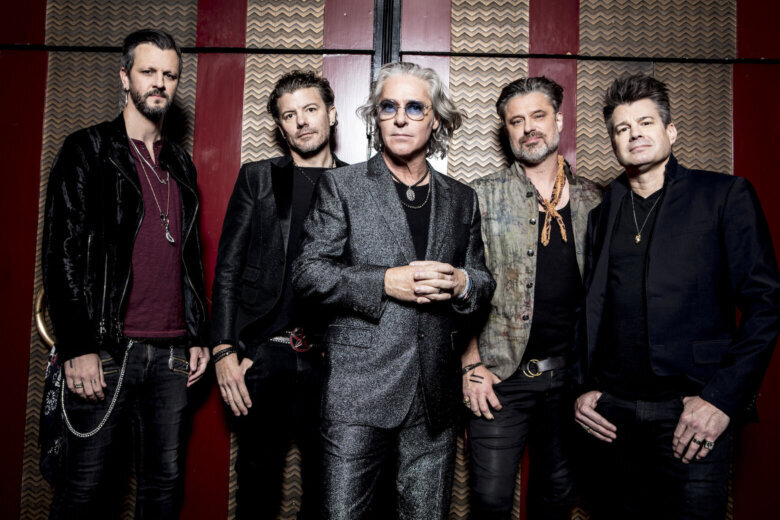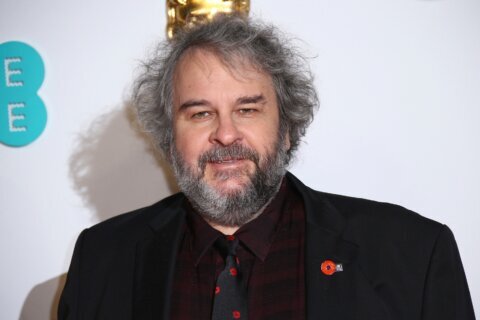Some of the best alternative-rock hits of the ’90s are about to echo across Prince William County.

This Saturday, Collective Soul rocks Jiffy Lube Live in Bristow, Virginia, on a triple bill that includes fellow ’90s sensations Edwin McCain and Hootie & The Blowfish.
WTOP caught up with Collective Soul’s longtime bass player Will Turpin to preview the concert.
“We were all signed to Atlantic Records in 1994, all three of us from the South, so we’ve always been good friends,” Turpin said. “We’ve never signed on for a 45-show summer tour together, but we’ve always played shows here and there together. This has turned out to be even cooler than we thought, as far as having fun backstage and looking at each other going, ‘Wow, we’re all three around 30 years later. Who would have thought?’ It’s pretty special.”
Born in Fairbanks, Alaska, Turpin’s family moved to Stockbridge, Georgia, where his father owned a music studio. He grew up as neighbors and church pals of future bandmate brothers Ed Roland (lead vocals) and Dean Roland (rhythm guitar), who soon added Shane Evans on drums and Ross Childress on guitar to form Collective Soul.
“It goes way back,” Turpin said. “Their father knew my grandfather. Their father would have been the minister in the largest Baptist church and my grandfather was the superintendent of schools way back when, but my dad owned a small recording studio that was all between a three block radius in a small town south of Atlanta. I literally do not have a memory without knowing who Dean and Ed were because I went to their church.”
The band’s first album “Hints, Allegations and Things Left Unsaid” (1993) was released on the independent label Rising Storm and caught the attention of the college radio station WRAS/Album 88 at Georgia State University.
“Dean delivered the record to the college station to a great friend of ours,” Turpin said. “Sandy Fine picked out a song called ‘Shine.’ We thought the first single would be ‘Goodnight, Good Guy’ or maybe another song called ‘Reach,’ but Sandy picked out ‘Shine’ and that really was the start of a tiny little snowball at the top of a hill. By the time a commercial station added ‘Shine’ to its rotation in Florida, we had pretty much every label interested in us.”
The album was rereleased by Atlantic Records and went double platinum thanks to smash hit “Shine,” which ranked No. 42 on VH1’s 100 Greatest Songs of the ’90s. The song’s iconic refrain of “heaven let your light shine down” transcended rock radio to pull in Christian rock fans and was later covered by Dolly Parton on her bluegrass album “Little Sparrow” (2001), winning the Grammy for Best Female Country Vocal Performance.
“It sounded like nothing else and it still does,” Turpin said. “I know Collective Soul has a sound, but that song, the one that started it all out, there was something special about the way it came together. … It’s basically Ed looking for answers, then Dolly rerecords the song and it kind of has a life of its own. … It’s something we really enjoy and the crowds still really enjoy singing along with us. It’s definitely one of the loudest parts of the evening.”
Their second album “Collective Soul” (1995), also known as “The Blue Album,” included the hit single “December,” chronicling the band’s struggle with its first manager by singing: “Turn your head now baby just spit me out.”
“That became the No. 1 rock song of ’95, so that was back-to-back No. 1 rock tunes from ‘Shine’ and then into ‘December,'” Turpin said. “It was a good concept song. As far as musically and harmonically, it’s kind of built around the same chord progression over and over. A lot of songs are like that, but you just build different sections and you weave in and out of those different sections and there’s ‘December.'”
The same album also included the band’s most contemplative (and singable) hit “The World I Know,” which remains one of the best songs of the era with a chilling chorus guaranteeing goose bumps: “So I walk up on high, and I step to the edge, to see my world below. And I laugh at myself, while the tears roll down, ’cause it’s the world I know.”
“He finished the lyrics right before we went to Europe when we were in New York,” Turpin said. “Ed’s lyrics are magical in the way that he might be thinking of something personal or something that the band is going through, but the lyrics are ambiguous enough that almost anybody can use these lyrics and think about their lives.”
The band has cranked out 10 more albums since, including “Disciplined Breakdown” (1997), “Dosage” (1999), “Blender” (2000), “Youth” (2004), “Afterwords” (2007), “Collective Soul” (2009), “See What You Started by Continuing” (2015) and Turpin’s favorite “Blood” (2019), as well as more recent efforts like “Vibrating” (2022) and their new double-album release “Here to Eternity” (2024) named after the 1953 film “From Here to Eternity.”
“We actually spent the night in one of Burt Lancaster’s Palm Springs homes,” Turpin said. “We also set up shop in Elvis’ Palm Springs estate for a month. We had a friend of a friend who bought Elvis’ Palm Springs home, it was a little in disrepair but it was left just like Elvis left it, red carpet, checkerboard floor. We set up in the main room looking at the pool and Palm Springs landscape and went at it. … We’re starting the set with two of those songs.”
Listen to our full conversation on the podcast below:
Get breaking news and daily headlines delivered to your email inbox by signing up here.
© 2024 WTOP. All Rights Reserved. This website is not intended for users located within the European Economic Area.









